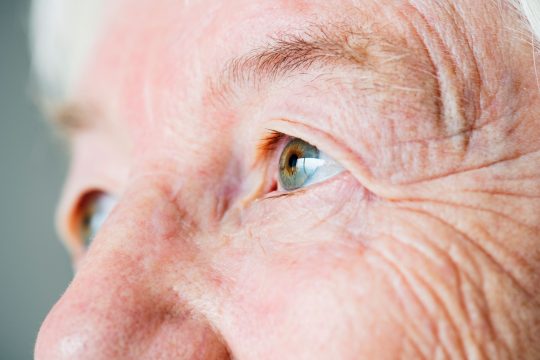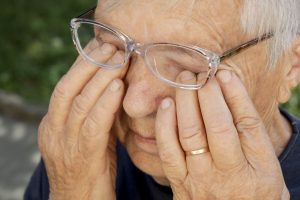
Dry eyes are a part of the natural aging process. In fact, it is estimated that around thirty percent of Canadians over the age of 50 experience symptoms associated with dry eye.
When eyes are healthy, they are constantly lubricated, but aging leads to a lower production of tears or an inability for the eyes to stay properly lubricated. For many older adults, this dryness can significantly affect quality of life by impacting their ability to perform daily activities such as reading, using a computer, and driving.
Explore the symptoms of dry eye and how older adults can get some relief below.
Dry Eyes and Aging: Dry Eyes Symptoms
Our eyes need tears to stay healthy and comfortable.
The surface of the eye is coated with a layer of tears called the tear film. This film keeps the eye’s surface smooth and clear. Dry eye occurs when the eyes don’t produce enough tears or produce tears without the proper chemical composition.
It’s important to note that symptoms vary from person to person and can even come and go. Here are some of the symptoms of dry eye.
- Stinging and burning in the eye.
- A scratchy or gritty feeling.
- Blurred vision, especially when reading.
- There are strings of mucus in or around your eyes.
- Your eyes are red or irritated.
- Watery eyes. Having a lot of tears in your eyes with dry eye might sound odd. But your eyes make more tears when they are irritated by dry eye.
Why Are My Eyes So Dry?
 According to the Canadian Association of Optometrists, there are many factors that contribute to dry eye. These include:
According to the Canadian Association of Optometrists, there are many factors that contribute to dry eye. These include:
- Aging
- Hormonal changes
- Glaucoma
- Eye surgery
- Low humidity, wind, or forced air heating and cooling systems.
- Problems with normal blinking.
Dry eye can also result from health conditions (e.g. rheumatoid arthritis, thyroid disease, Parkinson’s disease) and chronic inflammation. Taking certain medicines can also cause your eyes to be dry, such as:
- Diuretics (water pills) for high blood pressure
- Beta-blockers, for heart problems
- Allergy and cold medicines (antihistamines)
- Sleeping pills
- Anxiety and antidepressant medicines
- Heartburn medicines
How To Care for the Aging Dry Eye
To get some relief at home, older adults should pay attention to the situations that are most likely to cause their symptoms. Then find ways to manage those situations and reduce eye dryness.
Here are a few strategies to help sooth your dry eyes.
Artificial tears or ointments.
While serious cases of dry eye may require prescription medication, over-the-counter eye drops (artificial tears) are an effective and safe to use for mild cases of dry eye. And can provide fast relief from bothersome symptoms. If you need drops more than 4 times a day, use artificial tears without preservatives. They may irritate the eyes less.
Don’t use eyedrops that are meant to treat red, bloodshot eyes. Those might make your eyes feel worse.
Use a lubricating eye ointment or eye gel at bedtime. These are thicker and last longer, so you may have less burning, dryness, and itching when you wake up. Be aware that they may blur your vision for a short time, so seniors should take extra care if they are at a risk of falls. Apply ointments or gel just before sleep.
Try warm compresses.
Put a warm, moist cloth on your eyelids for about 5-10 minutes, twice a day. Then massage your eyelids lightly. This can:
- Improve oil gland function
- Increase oil flow into the eyes
- Stabilize the tear film
While compresses can have many benefits, it’s important to keep the washcloth or compress at an ideal temperature. It’s essential that your compress is warm, not hot. A compress that’s too hot can injure the skin around your eyes. For best results, use a warm compress daily in combination with other dry eye treatments.
Be aware of your environment.
 Add moisture to the air. In winter or during the change of seasons, a humidifier can add moisture to dry indoor air.
Add moisture to the air. In winter or during the change of seasons, a humidifier can add moisture to dry indoor air.
Avoid air blowing in your eyes. Don’t direct hair dryers, car heaters, air conditioners or fans toward your eyes. Wearing sunglasses – especially wrap around sunglasses – can help protect your eyes from wind and sun.
Take eye breaks.
If you’re reading or doing another task that requires visual concentration, take periodic eye breaks. Look away for 20 seconds or close your eyes for a few minutes. You can also try blinking repeatedly for a few seconds to help spread your tears evenly over your eyes.
Drink plenty of water.
Staying hydrated may help your tear ducts pump out more fluid. Seniors can avoid becoming dehydrated by drinking plenty of water (8 to 10 glasses) each day.
Keep eyelids clean.
While most people wash their face daily, few think about washing their eyelids. Keeping your eyelids, and eyelashes clean is essential to protecting your eye health.
It’s also an important step in reducing dry eyes, especially for older adults who wear eye makeup. Dirt, oil, and debris on the eyelids can cause inflammation and block oil ducts. Cleaning your eyelids can also prevent the buildup of bacteria that can cause eye conditions or eye diseases to develop.
The caring staff at All Seniors Care retirement homes can help you or your older family member wash their eyelids twice per day. To wash eyelids, use a mild cleanser or purchase eyelid cleaners.
Seek medical care
If your symptoms don’t get better, discuss it with your healthcare provider. They may recommend that you see an optometrist or ophthalmologist, because too much or chronic dryness can damage your eyes. They will examine your eyes, identify the underlying issue, and begin appropriate treatment.
Don’t Let Dry Eyes Affect Your Quality of Life
 Dry eyes can be irritating and uncomfortable to deal with, but you don’t need to let this condition affect your quality of life. With help from the care team at All Seniors Care Living Centres, you or your loved one can find ways to manage your dry eyes and relieve your symptoms.
Dry eyes can be irritating and uncomfortable to deal with, but you don’t need to let this condition affect your quality of life. With help from the care team at All Seniors Care Living Centres, you or your loved one can find ways to manage your dry eyes and relieve your symptoms.
Whether you are looking for senior housing Winnipeg, assisted living facilities in Regina, or retirement homes in Hamilton, contact us to discuss how we can help.
Writer – Julianna McLeod
Julianna is a health and wellness expert at All Seniors Care. Her mission is to create content that empowers seniors to form sustainable solutions for lasting health and happiness. She is an experienced writer, editor, and Recreational Therapist living in Toronto.